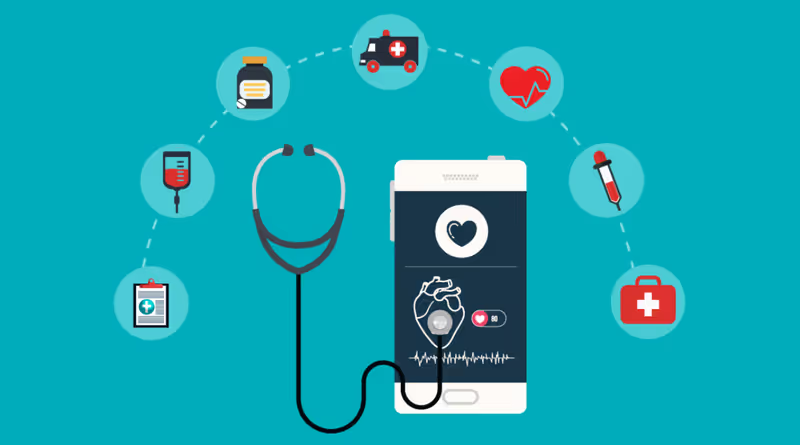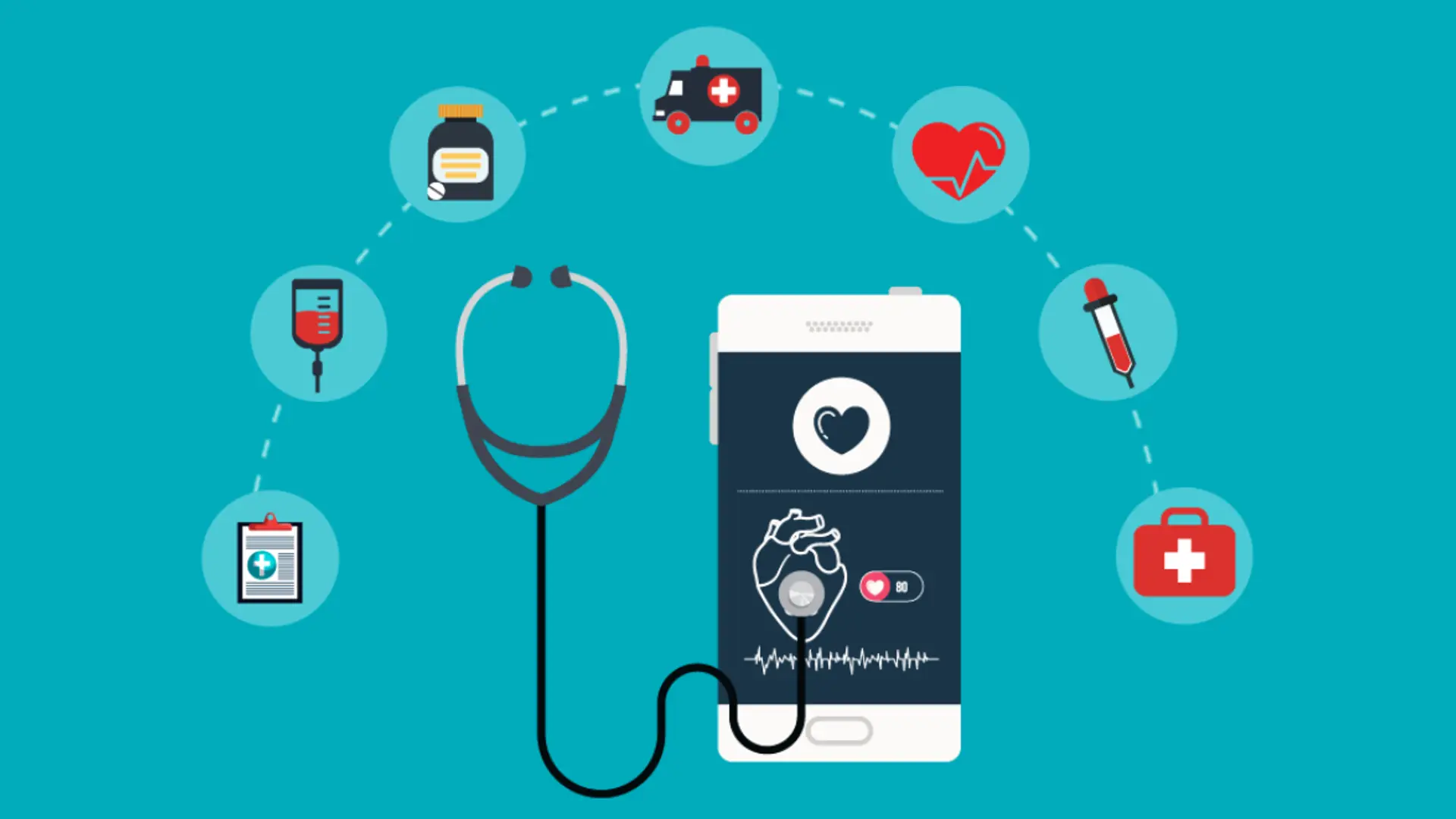

Top 10 Advantages of Mobile App for the Healthcare Industry | Healthcare App Development

While hospitals and healthcare workers worldwide make valiant efforts to save lives during the pandemic, COVID-19 is still spreading fast. There is no respite for doctors or nurses at the front-line fighting endlessly. As coronavirus hits the healthcare industry, practicing social distancing is our only way to ease the burden on the hospitals. But, what about non-corona patients? How do they get help? The answer is simple: telemedicine and healthcare mobile apps.
Healthcare mobile applications connect doctors with patients who need help, easing the burden on healthcare workers. For instance, HealthTap mobile app offers 24x7 virtual assistance to patients by connecting them to certified doctors through call, text, or video call. These applications allow doctors to learn about their patients’ symptoms and provide a digital prescription (if required). By leveraging such healthcare applications, the mobile health (mHealth) industry is expected to reach almost $60 billion this year, according to Statista.
Advantages of Healthcare Mobile app Development
There are several benefits associated with healthcare application development, especially during this crisis. Let’s take a look at ten key advantages of custom mobile application development for the healthcare industry:
Delivering Patient Care at Home
Considered a blessing for doctors, nurses, and other healthcare workers, the healthcare mobile application updates doctors about symptoms and ailing health conditions of the patient. These applications can be designed to check ailing symptoms and create a report. Following the report, the doctor may take apt decisions even offering prescriptions that could be accessed through the app.
In a recent survey by GreatCall, it was found that 93% of doctors favored mhealth apps to improve patients’ health while 40% believe it could reduce clinic visits. Another report suggests that the majority of physicians (around 80%) use smartphone apps to deliver patient care. Such instances prove the importance of healthcare mobile applications. These mobile apps can be customized to treat each patient.
Timely care even at remote locations
Rural locations or remote areas with limited healthcare facilities nearby could use healthcare mobile applications. With the use of mobile apps, these areas can avail timely care. By scheduling video calls with doctors offering prescriptions (if any) digitally, the majority of residents at faraway locations could get better care without having to travel to a hospital.
Regular clinic visits could be collectively avoided as doctors monitor their patients’ health through the smartphone app. Moreover, users can get important health tips through push notifications.
Simplified Healthcare with the Internet of Things (IoT)
With a compound annual growth rate (CAGR) of 27.6% between 2019-24, the global IoT healthcare market is forecasted to reach $188 billion by 2024 as per recent reports. Collecting data from connected healthcare devices (such as wearables) and transferring it to a healthcare service provider, the IoT simplifies the task for all healthcare professionals. The technology makes it easier to monitor the vital health parameters and alert the healthcare service provider when it exceeds the threshold value. IoT collaborates with medical and healthcare mobile apps delivering better care to patients while generating revenue opportunities for stakeholders.
Moreover, with IoT, the treatment cost is also reduced significantly making it easier for patients to follow instructions.
Creates new Vibrant Opportunities
From an increased focus on patient-centric healthcare delivery to the adoption of advanced technologies, several key factors are expected to drive growth opportunities in the healthcare mobile industry. As a result, the global mHealth solutions market with a CAGR of 33.3% is expected to reach $213.6 billion by 2025 according to statistics.
Several categories of mHealth apps (like pregnancy care and women’s health) are witnessing more downloads and have created new vibrant opportunities in healthcare application development. Apple, for instance, with its CareKit framework is empowering the healthcare sector allowing more opportunities for custom mobile app development.
While North America continues to dominate the mHealth solutions market, regions across the globe are gradually catching up.
Accurate Patient Diagnostics
Healthcare mobile apps with their intelligent health diagnostic approach minimize errors that may prove fatal for the patient. With accurate health monitoring, doctors can prescribe correct medicine with the right dosage to patients. Healthcare mobile apps use sensors to track and monitor various health parameters accurately.
Moreover, the patients’ reports and prescription notes can be easily saved using cloud facilities. Even medical staff can store patients' data and keep the record in a precise manner.
Secure Payment Options
Standing in a queue waiting to pay your medical bill is a thing of the past. With secure payment gateways integrated into healthcare mobile apps, bill payment becomes a hassle-free process. Choose between your preferred payment mode (debit card, credit card, or mobile payment gateways like Paypal) to pay bills timely. Also, if you forget to make a payment, these apps will send notification as a reminder.
For instance, Cedar Pay - a premier tech firm partners with healthcare service providers to take care of billing. With seamless payment experience on mobile, Cedar Pay increases patient satisfaction making businesses healthy.
Cost-Effective
While healthcare mobile apps offer convenience to the user, it also eases the burden on their pockets reducing medical bills. For instance, a regular clinic visit in the US costs between $100 - $200 for initial consultation while HealthTap - a mobile app, charges less than $119/year for 24x7 virtual healthcare from trusted doctors. Hence, some tasks like face-to-face consultation or doctor prescriptions can be done through a healthcare mobile app. This reduces the burden on your wallet and is simply cost-effective.
Power to monitor your health
One of the biggest benefits of using healthcare mobile apps is the power to track and monitor your health every day. Brands like Fitbit with its line-up of smart-watches, trackers, and other wearable devices offer individuals access to monitor and improve their health on a daily basis. By leveraging powerful healthcare apps in wearables, patients can measure:
- Blood pressure
- Sugar level
- Weight
- Cholesterol level
- Heart rate and more
Individuals can also take timely action when the parameters increase or decrease.
Real-Time Communication
Apart from inspecting the patient’s condition using high-definition cameras, mobile apps can also be used for real-time collaboration, consultation, and information sharing with doctors globally. This benefits the patients as doctors from across the globe can learn and share knowledge in real-time. Moreover, regular real-time communication between patients and doctors also improves monitoring by keeping a constant check on health.
Custom Design Remedies
Long waiting queues and appointment delays are mainly due to a large number of patients a doctor has to see every day. To ease the burden on the hospitals and clinics, custom design remedies using mobile apps are the answer. Utilizing patient data to create profiles in healthcare applications, doctors can provide optimal solutions or remedies to individual patients in a limited time.
Conclusion
To ease the burden on healthcare workers and hospitals amid lockdowns, the use of healthcare mobile apps is being emphasized. Consult the team at FATbit Technologies to develop a custom mobile application for the healthcare industry.





